Is Katori Hall (b. 1981) the embodiment of Martin Luther King’s dream? She was born in Memphis, the city where King died. The Mountaintop, her play about his last night alive, had its world premiere at Theatre 503, a tiny pub stage in south London. But the unanimity of the reviews, combined with the timely arrival of a black man in the White House, propelled the two-hander into the West End where it played to standing ovations from notably multiracial audiences. In a year which saw the premiere of Enron by Lucy Prebble and Jerusalem by Jez Butterworth, it won the coveted Best New Play award at the Oliviers.
The title for The Mountaintop comes from the address King gave the day before he was shot. The play is set in a room of the Lorraine Motel, on whose balcony King was assassinated. The building is now the National Civil Rights Museum. Hall took the opportunity to tinker with history. In the play King’s last long conversation is with an alluring chambermaid who brings him coffee and shares her Pall Malls. King, a noted ladies’ man, has his eye on her, but it becomes apparent across the long night that she is not all she seems. In fact she is an angel who has been sent down to summon him to the promised land.
Two new productions of The Mountaintop reach the stage this month, at the Young Vic and in The Other Room in Cardiff (named Fringe Theatre of The Year The Stage). Hall talks to theartsdesk about the origins of the play, and of her young writing career. Hall tells theartsdesk about the origins of the play, and of her young writing career.
JASPER REES: When did you first see the hotel room (pictured below) where King spent his last night?
KATORI HALL: I don't know how old I was but I was quite young. I would say 13ish, 14. At that moment in time you don't necessarily understand that you’re walking into a historical monument.
Has it been left as it was found?
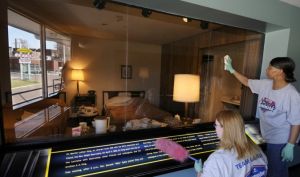 The Lorraine Motel was closed for a little bit after it changed hands after the assassination. That area of downtown Memphis went down because of the riots. It just became a very dilapidated area. I forgot what year it was turned into the National Civil Rights museum but the curators sought to replicate how it was, with the cigarette beds everywhere, coffee cups scattered around the room, the unmade bed.
The Lorraine Motel was closed for a little bit after it changed hands after the assassination. That area of downtown Memphis went down because of the riots. It just became a very dilapidated area. I forgot what year it was turned into the National Civil Rights museum but the curators sought to replicate how it was, with the cigarette beds everywhere, coffee cups scattered around the room, the unmade bed.
Was the room a direct inspiration?
Oh, definitely. I decided to write this play in late 2007. And for my research I decided not to read too much. I decided to go to the places. If you read the script you would see that I basically write it out visual for visual how the left bed is versus the right bed, how the coffee cups are displayed. I had to do a piece of short fiction at the top of the play where I really described very exactly how I saw the Lorraine Motel. And then I went to the King Centre in Atlanta. There is another museum there and I listened to documentaries with old friends. Since I started writing, April 2008 was the 40th anniversary of his assassination so a lot of interviews popped up so it was the perfect time to write the play. It was a coincidence. I didn't know that all this stuff was going to come out.
What is it about him that works as a dramatic character?
Because I grew up in Memphis, Tennessee I always have this image of King as this God. You walk into my grandmother’s house. There’s two pictures on the wall. There’s a picture of Jesus and right beside it there’s Dr Martin Luther King. And so this is the culture that I was born into where this man was given so much reverence that you think of the balcony as a kind of crucifixion point, a cross. I grew up knowing that this man was incredibly important not only to African Americans but also to people all across the world. So I felt he was quite untouchable. He was an icon. He was frozen in the past for me.
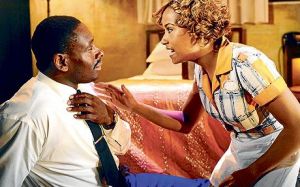 (Left: David Harewood and Lorraine Burroughs in Theatre 503's production of The Mountaintop)
(Left: David Harewood and Lorraine Burroughs in Theatre 503's production of The Mountaintop)
As I got older - I majored in African-American Studies at Columbia – I began to learn about his imperfections. I began to learn a little bit more about his human side. I learned that he had extra-marital affairs, that he drank sometimes when he got really, really stressed out. I began to gather all these little details about his own humanity. And so it came to a point where I decided that I wanted to create a King that we have never seen before. I wanted to create the behind-the-doors King versus the “I Have a Dream” King.
A lot of people don’t know that towards the end of his life he was extremely depressed: he was chain-smoking like crazy, the FBI were tormenting him. He was extremely, extremely depressed, getting to the point where he was considering suicide. A lot of people don’t know this. And I think it’s just so incredible that we have this extremely strong character in our history that was actually a man. For me the dramatic possibilities of fleshing him out as a human being were just boundless and I felt it would be a perfect subject matter for a play to really focus on a moment in time where he was going through a lot of changes and challenges. All the other plays and other films that we have seen have not necessarily captured him in such a detailed life.
Do we know that he was waiting for the bullet?
Oh yes. He talked about his death all the time. He joked about it with his aides all the time. He knew that what he was doing – standing up against the huge government and the Jim Crow laws – that in a way he was writing his own death sentence. That just shows how incredibly brave he was.
He was very very short. But the more and more he spoke the taller and taller he got.
Do you think he craved the bullet, as you suggest in the play?
Just imagine the sheer amount of stress. He’s always away from home, he’s eating bad food. I think about other political leaders. I was reading that Obama gets 12,000 death threats, four times as many as Bush. Why? Obviously because he’s African-American. Let’s be honest about it.
When you started this play to what extent were you thinking about Obama as well?
I wasn’t thinking anything about Obama. As a matter of fact I was thinking of voting for Hillary. The Democratic primaries had just started and my whole family is very Clinton. But I must admit that somehow I did know that Obama was going to be elected. I finished the play in early 2008 and I did have a very deep sense of clairvoyancy that Obama was going to be elected.
There is a line in the play in which the angel/chambermaid refers to Obama in the future.
“There is one. Some say he kinda got your tongue. But there’ll never be another you.”
When you wrote that was he even nominated?
I don’t think so. It was a dream.
You mention Clinton. Is there something about his magnetism which is indivisible from his craving for sex?
I think that men in incredible positions of power have a lot of temptations. I think they are able to acquire positions of power due to charisma and obviously King had a lot of charisma. There is this little story that people don’t know about. He visited Morehouse when he was younger and there were a lot of women and they surrounded him and they were chanting his name and what he did was he wrote his phone number on a napkin and threw it out to the crowd. These women went crazy. Like young white women did with The Beatles, they went crazy over this napkin. That little episode is very reflective of the kind of sexual power that he had. And it’s funny because he was very, very short. But the more and more he spoke, the taller and taller he got. I do believe that he had this ability to attract not only women but people in general. Because he was always away from home and he always had temptation thrown into his face and also because of the immense amount of pressure, I would assume that he would want some kind of release. Everyone has their crack. Everyone has their addiction. I think that might have been his fatal flaw.
To what extent are you the embodiment of the dream that “yes we can”?
I think I owe a lot of who I am to King’s movement or rather his particular vision. I think about my young life, about the fact that I have been able to acquire an incredible education from primary school. My family moved from a certain section of town in Memphis that was bad or whatever and moved me to the suburbs where we were one of three black families. They desegregated the neighbourhood. In 10 years the neighbourhood turned from lily white to all black because there was this movement of white people from the neighbourhood because all these black people started moving in.
So I think King definitely set up this culture where black people felt they could live beside white people and work with white people. I have many, many white friends that I’m close to. I don’t think if I grew up in the Sixties that I would have had that much access or had that many moments of intimacy with my white colleagues. Most of my best friends are white. My dad doesn’t have any white friends. When I wanted a white boyfriend he went crazy. But then my older sister married a white man. He’s an Italian Republican. That’s another story. I just feel King planted the seeds in our society where black people were seen as people and not just black people. I’ve acquired many accomplishments because of the education I’ve been able to acquire and it’s going beyond that. Now, all that being said, we still live in a society that’s crazy. Henry Louis Gates got arrested for breaking into his own home. One very small example of just how far we have to go.
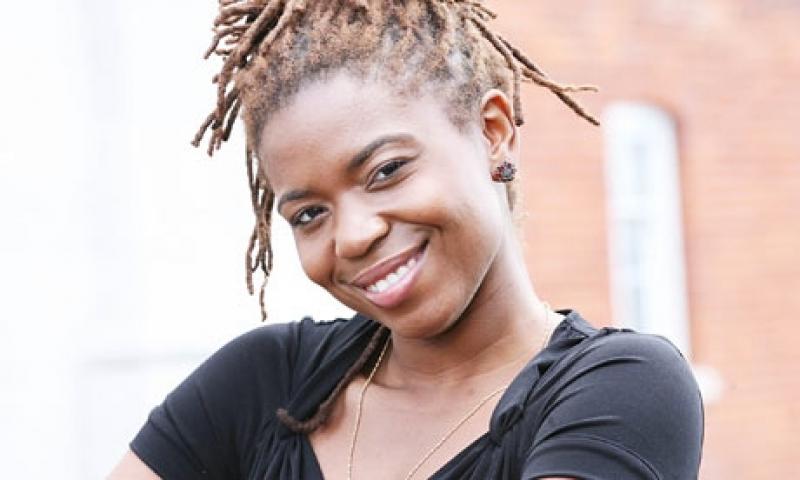 When did you start writing? (Katori Hall pictured above)
When did you start writing? (Katori Hall pictured above)
I’ve written journalism since I was 14 years old. I was a teen staffer at the local newspaper, The Commercial Appeal. I thought I was going to be a journalist. I didn't necessarily know that I was going to dabble with plays. But I felt I really like people and putting words in people’s mouths.
When did you stop studying?
I’ve just stopped studying. In May I graduated from the Juilliard playwriting programme. I didn't even go to graduation because I was here rehearsing. It’s a two-year programme. I was at Columbia for four years as an undergrad. Then after that I went to Harvard to get my Masters in acting. That was a two-year programme, and then for two years I worked for radio doing executive assistant bullshit, and then I went to Juilliard. I’ve been in school for a long time. I should be a doctor by now but I’m not.
I tend to write about the black people that even black people don't want to hear from
And when did you start writing plays?
I would say my last year at Columbia was when I kind of buckled down and started writing plays. I actually started my first play in my senior year and while I was at acting school I continued to write. I ended up sending that first play out and ended up getting a lot of attention and a lot of awards for it so it was kind of like a validation of my talent and I was like, “Perhaps I should do this.” The Mountaintop is probably my fifth play. I just wrote fiercely from my senior year to this point. I was just writing play after play after play.
Was this play part of your studies?
This was entirely separate. The wonderful thing about the Juilliard programme is they don’t really give you writing exercises or teach you how to write. You bring in stuff that you’ve already written and you present it to the class. In that way it’s more like a writing workshop. However, it definitely is a school because it does provide you with connections once you graduate. It really is a bridge to the professional world.
Are your plays all about the African-American experience?
Oh yeah. I tend to write about the black people that even black people don't want to hear from. They are extremely poor. I would say they are considered to be the invisible Americans. I had this play called Hurt Village which is set in a housing project that was demolished in Memphis. I really seek to give voice to the voiceless. And that hasn’t always worked in my favour in terms of getting plays produced. I also tend to write extremely big casts. A big cast in America is nine. That’s actually humongous. I tend to write really big plays that require really big sets and are about big ideas. Even The Mountaintop – that young black female poor voice is not necessarily articulated in a very deft way onstage or in cinema. I love to write full-bodied black women. I don't get to see that very much. There are of course a lot of amazing playwrights that are doing that. We’re just not being produced, and definitely not on Broadway.
Is that because the black audience doesn’t exist?
Which is a bald-faced lie. Black people go to see theatre. (Pictured below: Gbolahan Obisesan and Ronke Adékoluejo in rehearsal for the Young Vic's production of The Mountaintop © Leon Puplett)
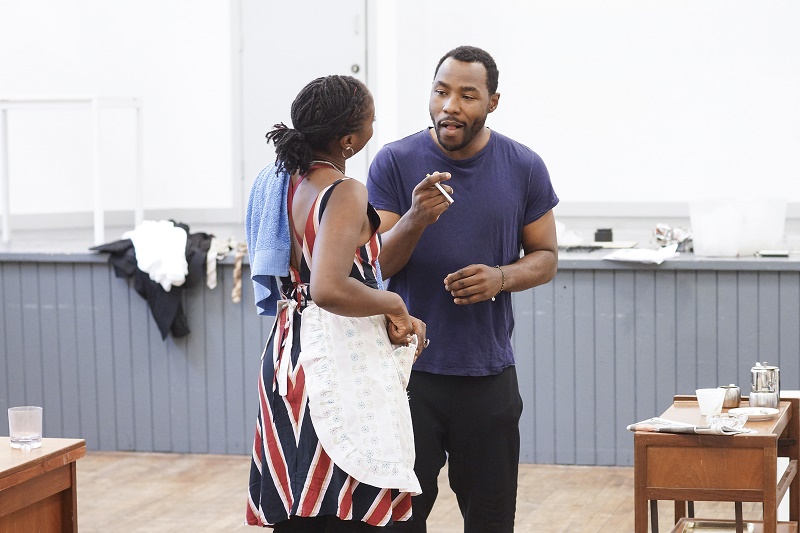 How did this play find its way to the UK?
How did this play find its way to the UK?
During the workshop process we had over there I was able to develop the play and see what the audience was reacting to mostly. The opportunity came up. It was luck. James Dacre, the director, emailed in March 2009 and said, “I’m going to a meeting at Theatre 503. Can you send me a play you’ve been working on?” I know James because he directed me in a workshop. He was in New York on a Fulbright. After then we lost touch until he emails me out of the blue and says, “I’ve been following your work, I want to talk to this theatre about you.” Two weeks later he’s like, “You know they want to do it.” I was like, “Whatever.” I emailed my agent and my agent said, “Oh hell no, it’s a waste of time. We have bigger fish to fry.” But I talked to another American playwright who had been produced at 503. She just gave a love letter about them. There are American theatres who knew about this play. Nobody was biting on it. I decided that I really had nothing to lose. If it stinks it stinks and no one in America will know about it. So for me it was a risk, yes, but at the end of the day I didn’t have a production anywhere else.
How declamatory was King offstage?
Of course we really don’t know how he was privately because he actually was his own publicist and really created a persona for himself. In interviews there is that sense of a vibrato there but I guess the only way you can find out if he did it behind closed doors is if you listened to the FBI tapes which are sealed until 2025. I would be the first person to listen to them because I think it’s really important to understand who he was behind that mask of martyr.
Was there something synthetic about his performance?
No I don't think it was synthetic at all. But you can see the preacher in him. That vibrato, that timbre in his voice, comes from a long tradition of Baptist preachers. And Baptist preaching is a performance. There is something slightly removed from the person. It is acting in a way. But that’s just the tradition that he grew up in and was part of and used quite well in a political way. (Pictured below: Alexandria Riley and Mensah Bediako rehearse for the Cardiff production of The Mountaintop. Photograph by Aenne Pallasca)
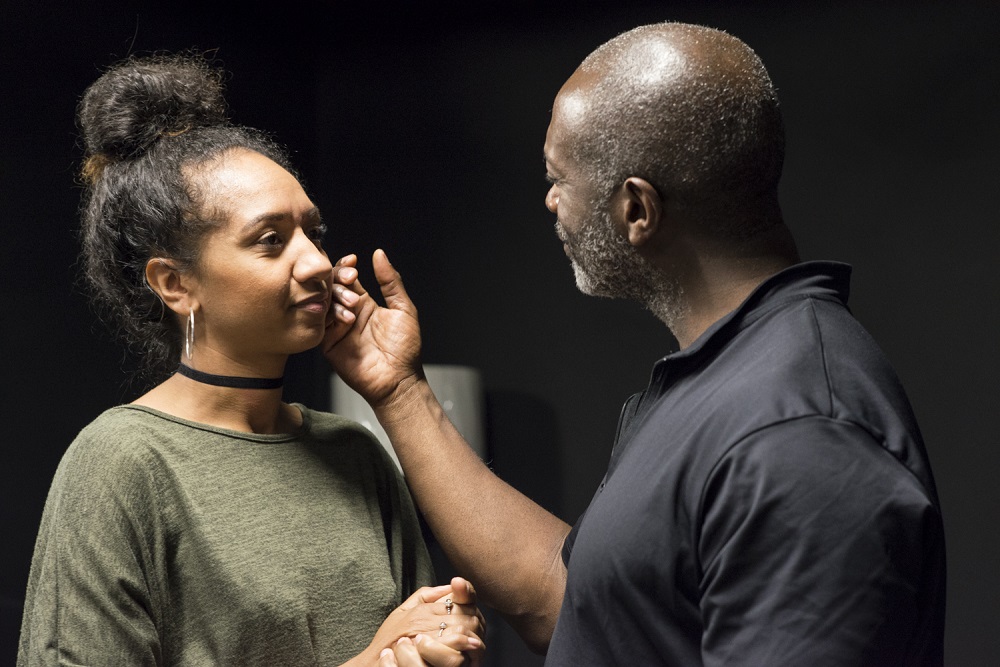 What do your family say about the play’s success?
What do your family say about the play’s success?
I was mostly inspired to write the play because of my mother’s experience. She grew up around the motel and when he came to lead the sanitation workers’ strike she wanted to go and hear him speak at the church that he gave the mountaintop speech at. However, there was word that somebody was going to bomb the church so my grandmother was like, “You can’t go. You’re going to get killed if you go hear him speak.” So she decided not to go. The next day he was assassinated and it’s the biggest regret of her life because she had the opportunity to witness history and she was too scared to take it.
So knowing that, my mother was able to come over and see the closing of the play. She actually had never left America before. She had left Memphis but she had never been out of the country. So we had to expedite her passport and what not. And when she saw the play I saw her nodding her head a lot. I would check in a lot on her because I named the maid Carrie May after my mother. She’s named after my mother’s nickname Camae. She’s nodding all throughout the play and afterwards she’s like, “You got everything right. It’s like I was transported back in time and I was actually able to see King just before he died.”
So I was very, very happy that my mother was happy with the play and felt that it was accurate even though it was fictional. I was concerned that she would freak out at all the cursing but my mamma cursed. That’s where I got it from. She cursed really, really bad. Actually I did a reading of the play and somebody was like, “Black women in 1968 didn’t curse.” And I’m like, “What! Are you crazy?” My father hasn’t seen it because he wasn’t able to get off work. My mother, due to the recession, has been laid off and therefore has a lot of time on her hands. She was a phlembotamist. A person who draws blood. My father is a boiler watcher for a Teflon company. They’re very working-class folk.
How have you managed not to be educated out of your roots?
I go back home all the time. Four or five times a year. All the holidays. In order for me to pursue my dream I obviously have to be in New York. I’m a playwright. That is where I need to be based if I want to make a career out of this. However, a lot of my plays are rooted in Memphis. So I definitely go back a lot for inspiration. All my life I’ve been able to code-switch – to be with these kinds of people and those kinds of people. It’s probably the reason I love acting. A lot of people sometimes can’t pinpoint where I’m from because my southern accent has faded away. When I’m down south people will call me Oreo. “Oh, you talk white.” And I really don't talk that white, to be honest. Even when I’m on the phone with my mamma there’s a little bit more drawl, there’s a little bit more southern slang that I use. I don’t have to put on a mask that way. It happened more so when I was younger because you have to fit in and you don't know exactly who you are. But the older you get, the more you become who you are.

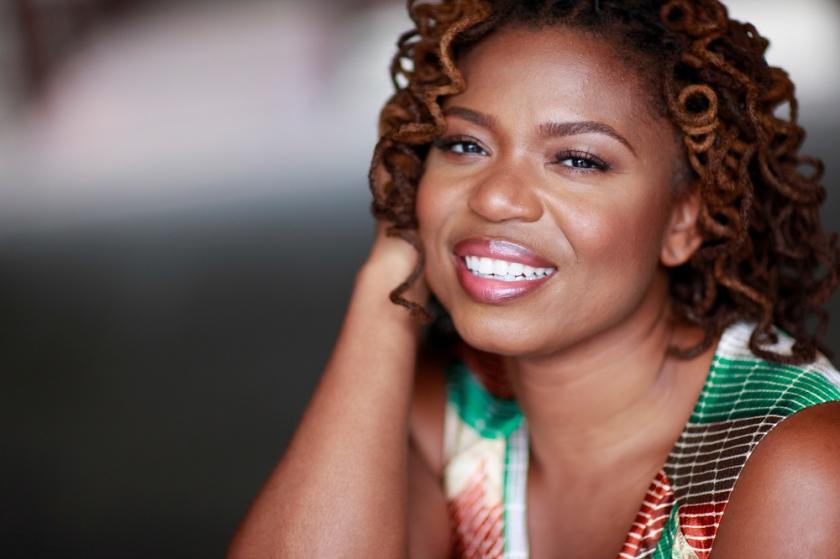













Add comment